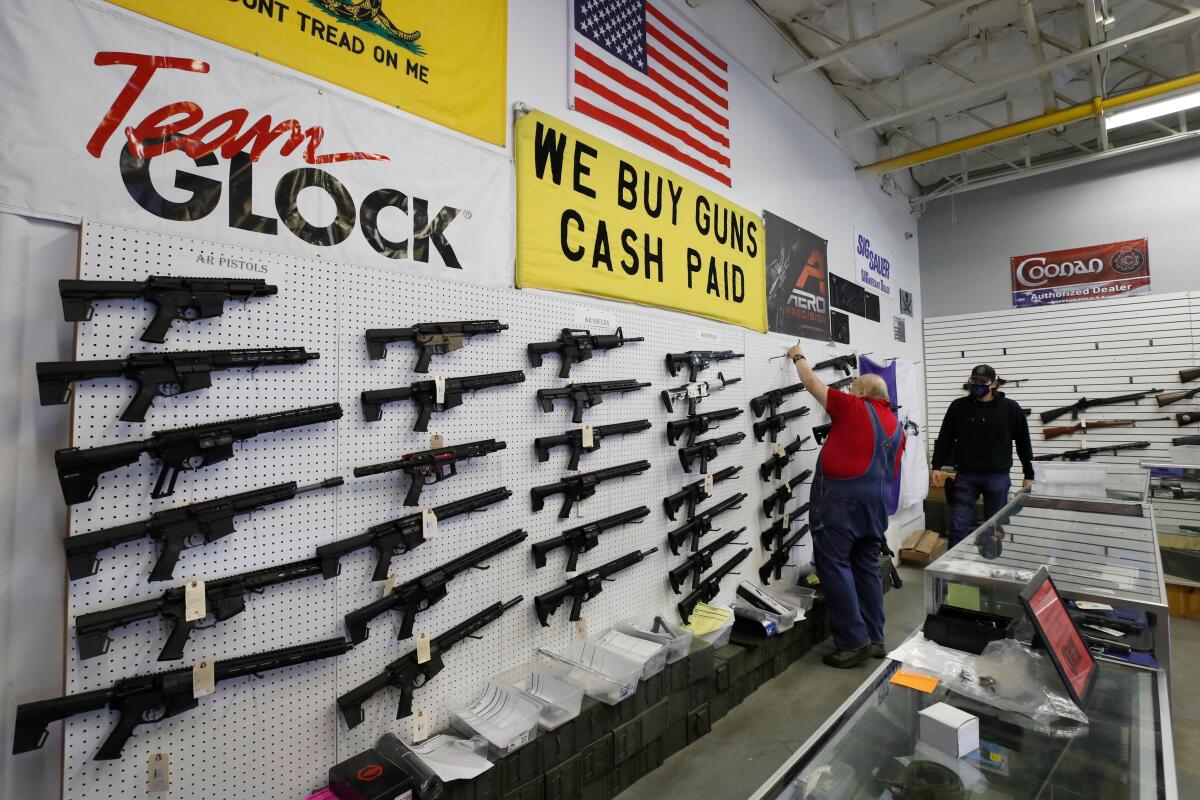U.S. appeals court vacates gun conviction because COVID rules had closed trial to the public

- Share via
A federal appeals court Monday vacated a man’s gun conviction in a lower court in Northern California because COVID-19 protocols had precluded the public from observing his trial.
In a 3-0 decision, a panel of the U.S. 9th Circuit Court of Appeals found that the district court’s restrictions last year — which provided the public with an audio stream of the trial, but not video — had violated defendant James David Allen II’s right to a public trial under the 6th Amendment.
“Here the district court cannot show that allowing a limited number of members of the public to view the trial in the courtroom, or via a live-streamed video in a different room, would imperil public health,” the appeals panel ruled.
As a remedy, the panel remanded Allen’s case back to the U.S. District Court for the Northern District of California for a new trial. It also ordered that Allen be given a new pretrial hearing to argue for the suppression of certain evidence, as an initial hearing on those matters was similarly held out of public view.
Allen had been found guilty of being a felon in possession of a firearm and was sentenced to six years in prison. According to prosecutors, Allen traveled in 2020 from his home state of Washington to California with an AR-15-style rifle, intending to harm a San Francisco stockbroker.
Police found him asleep in a car, with weapons, in July 2020 in Pinole, Calif. Allen had told the court that a drug relapse led to his life unraveling.
Allen could not be reached Monday. Hanni Fakhoury, his attorney, and Lisa Ma, an assistant federal public defender who argued in the case, declined to comment.
It is unclear what potential implications the appeals court’s ruling could have on other cases held under similar COVID-19-related restrictions, or even how many such trials there have been — either in the District Court for the Northern District of California or elsewhere in the state and country.
A spokesperson for the Northern District court declined to comment Monday, saying it “doesn’t offer comment on specific cases.”
A spokeswoman for the appeals court said it “does not track or have any way of knowing how many cases occurred in the district courts” under the conditions present in Allen’s case.
“The court addresses the questions raised by parties in individual appeals as they come before it,” the spokeswoman said. She otherwise declined to comment, saying the decision “speaks for itself.”
In its decision, the 9th Circuit Court of Appeals did not find constitutional violations in the general COVID-19 protocols that were put in place by the chief judge for the Northern District, which were that criminal trials could proceed with some restrictions in place.
Instead, the appeals court took aim at what it said were the “additional COVID restrictions” specifically adopted in Allen’s case by presiding U.S. District Judge Haywood S. Gilliam Jr., which “precluded members of the public from entering the courtroom, and gave them access to the proceedings only by streaming audio over the internet.”
While the lower court “had to strike a balance between protecting a defendant’s public trial right and the goal of stemming the spread of COVID,” and courts can set limited restrictions on access for compelling reasons, Gilliam’s restrictions on visual access to the trial — which he enforced over objections from Allen and his counsel — went too far, the higher court wrote.
“Although a listener may be able to detect vocal inflections or emphases that could not be discerned from a cold transcript, an audio stream deprives the listener of information regarding the trial participant’s demeanor and body language,” the court found. “Nor can a listener observe the judge’s attitude or the reactions of the jury to a witness’s testimony, or scan any visual exhibits.”
In fact, the court said, the District Court had “implicitly acknowledged the value of visual observation” when it required witnesses in Allen’s trial to wear transparent masks.
The court also wrote that the “failure to make the judge, counsel, defendant and jury subject to the public’s eye (as well as its ear) undermines confidence in the proceedings.”
The court wrote that its decision came after a review of protocols in other U.S. courts during the same period showed that Gilliam’s measures were “truly exceptional.”
For example, other federal courts had “consistently allowed some form of visual access to the trial, either by allowing the public to view a live video feed of the trial in a separate room in the courthouse, or by allowing a limited number of spectators to be present in the courtroom,” the appeals court wrote.
Given that such alternatives were available, the audio-only trial in Allen’s case was insufficient, particularly as there were no other considerations — such as national security concerns — that might have warranted the closed-door policy.
The opinion was written by Judge Sandra Ikuta, who was appointed by President George W. Bush. Ikuta was joined by Judges Lawrence VanDyke, who was appointed by President Trump, and Carlos F. Lucero, appointed by President Clinton and sitting by designation from the 10th Circuit.
The appeals court separately rejected claims from Allen that he was denied a speedy trial.
More to Read
Sign up for Essential California
The most important California stories and recommendations in your inbox every morning.
You may occasionally receive promotional content from the Los Angeles Times.











